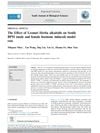 5 citations,
May 2020 in “Clinical and Experimental Dermatology”
5 citations,
May 2020 in “Clinical and Experimental Dermatology” Clascoterone may be a promising treatment for hair loss.
5 citations,
June 2018 in “Elsevier eBooks” Testosterone is important for male sexual traits, reproduction, muscle and bone health, blood production, and metabolism, and works both directly and after being changed into other hormones.
 5 citations,
January 2017 in “Endocrinology”
5 citations,
January 2017 in “Endocrinology” Genetic defects in testosterone production can cause hormonal and developmental disorders, and more research is needed to understand androgen regulation and develop safer treatments.
5 citations,
June 2015 in “Chinese journal of natural medicines/Zhongguo tianran yaowu/Chinese Journal of Natural Medicines” Tripterygium wilfordii multiglycoside effectively reduced prostate enlargement in rats without harmful effects.
5 citations,
January 2013 in “Spatula DD - Peer Reviewed Journal on Complementary Medicine and Drug Discovery” Trigonella foenum-graecum seeds and Butea monosperma flowers help promote hair growth and reduce hair loss after chemotherapy.
 5 citations,
May 2012 in “Andrologia”
5 citations,
May 2012 in “Andrologia” Finasteride use may be linked to rare testicular tumor, but more research needed.
 5 citations,
January 2012 in “Biological & Pharmaceutical Bulletin”
5 citations,
January 2012 in “Biological & Pharmaceutical Bulletin” Hura crepitans and its compound daphne factor F3 may help treat hair loss by blocking a specific hair growth inhibitor.
 5 citations,
January 2005 in “Journal of Enzyme Inhibition and Medicinal Chemistry”
5 citations,
January 2005 in “Journal of Enzyme Inhibition and Medicinal Chemistry” New steroids were effective in blocking male hormone receptors in hamster prostates.
 5 citations,
December 1979 in “Clinical and Experimental Dermatology”
5 citations,
December 1979 in “Clinical and Experimental Dermatology” Anti-androgens are effective for female acne but less so for male-pattern hair loss, with side effects similar to birth control pills.
 4 citations,
October 2022 in “Evidence-based complementary and alternative medicine”
4 citations,
October 2022 in “Evidence-based complementary and alternative medicine” Ficus carica extract improved fertility in rats and may help with certain health conditions.
 4 citations,
February 2022 in “International Journal of Cosmetic Science”
4 citations,
February 2022 in “International Journal of Cosmetic Science” Watercress extract helps increase hair growth and thickness by blocking hair loss factors.
 4 citations,
August 2021 in “Annals of Translational Medicine”
4 citations,
August 2021 in “Annals of Translational Medicine” Dihydroartemisinin helps reduce prostate enlargement in rats by stopping the growth of prostate cells.
 4 citations,
July 2021 in “Journal of Dermatological Treatment”
4 citations,
July 2021 in “Journal of Dermatological Treatment” Finasteride helps hair growth but may cause sexual side effects and depression.
 4 citations,
April 2021 in “Journal of Cosmetic Dermatology”
4 citations,
April 2021 in “Journal of Cosmetic Dermatology” Botulinum toxin may help hair loss by increasing blood flow and reducing harmful factors.
4 citations,
February 2021 in “Journal of Pharmaceutical Sciences” The model can help predict how finasteride and minoxidil work when applied to the scalp.
4 citations,
December 2020 in “Giornale italiano di dermatologia e venereologia” Italian guidelines recommend using trichoscopy for diagnosis and treatments like minoxidil for hair loss.
 4 citations,
September 2020 in “Frontiers in Microbiology”
4 citations,
September 2020 in “Frontiers in Microbiology” Algal oligosaccharides help prevent hair loss and promote hair growth.
4 citations,
March 2019 in “JAT. Journal of applied toxicology/Journal of applied toxicology” PFOS exposure disrupts hormone levels and enzyme activities in juvenile frogs, affecting males and females differently.
 4 citations,
March 2017 in “Al-Mi’galaẗ al-sa'udiyaẗ lī-ulum al-ḥayaẗ”
4 citations,
March 2017 in “Al-Mi’galaẗ al-sa'udiyaẗ lī-ulum al-ḥayaẗ” Leonuri Herba alkaloids may help treat hormone-induced enlarged prostate in rats.
 4 citations,
January 2015 in “Endocrinology & metabolic syndrome”
4 citations,
January 2015 in “Endocrinology & metabolic syndrome” Testosterone can cause acne and male-pattern baldness, affects hair growth in men and women, and makes male skin more sensitive.
 4 citations,
December 2014 in “PubMed”
4 citations,
December 2014 in “PubMed” Pre-operative hormone treatment for hypospadias surgery might improve outcomes, but more research is needed to confirm.
 4 citations,
April 2012 in “Medical Hypotheses”
4 citations,
April 2012 in “Medical Hypotheses” Finasteride may improve stem cell therapy for heart attacks by increasing cell survival.
 4 citations,
April 2002 in “Medical Hypotheses”
4 citations,
April 2002 in “Medical Hypotheses” Hormones cause hair loss by affecting cell growth and weakening cell attraction.
 3 citations,
March 2022 in “Polymers”
3 citations,
March 2022 in “Polymers” Substances from Ascidian tunics might help treat hair loss as effectively as Minoxidil.
3 citations,
January 2022 in “Journal of neuroendocrinology” Sex hormones affect brain cells differently in males and females.
 3 citations,
October 2021 in “Clinica Chimica Acta”
3 citations,
October 2021 in “Clinica Chimica Acta” Hormone levels in hair vary across the head, with the highest concentration of a key hormone linked to hair loss at the top.
 3 citations,
June 2021 in “Cosmetics”
3 citations,
June 2021 in “Cosmetics” A mix of sulforaphane, L-menthol, and dexpanthenol could help increase hair growth and reduce hair loss.
 3 citations,
May 2021 in “Dermatologic Clinics”
3 citations,
May 2021 in “Dermatologic Clinics” The document concludes that more research is needed to understand hair loss in men and to find new treatments.
 3 citations,
October 2019 in “Dermatologic Therapy”
3 citations,
October 2019 in “Dermatologic Therapy” Hair loss in men is mainly caused by hormones and genes, and while current treatments can slow it down, they can't fully stop it.
 3 citations,
September 2019 in “PLOS ONE”
3 citations,
September 2019 in “PLOS ONE” Genetic variations affect dutasteride treatment response for male pattern hair loss.























